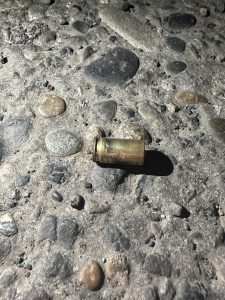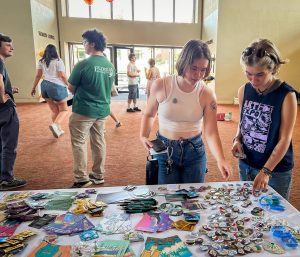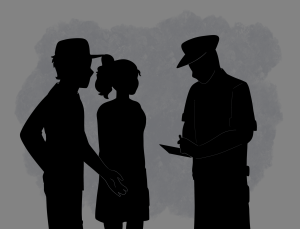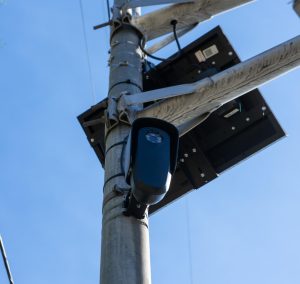Town Hall Considers Question of Free Speech
October 24, 2017
ASWC’s first town hall of the year saw Vice President for Diversity and Inclusion Kazi Joshua, Dean of Students Darren Mooko and Dean of Faculty Melissa Clearfield start a discussion about free speech on campus. In light of recent riots at colleges in response to alt-right speakers, such as at UC Berkeley, free speech is an especially fraught subject.
Clearfield was the first speaker of the night, defining the First Amendment and explaining its limitations. Freedom of speech applies to all government agencies and officials, but does not protect speakers against private individuals or organizations, such as private employers or private colleges like Whitman.
As Clearfield explained, private individuals and organizations are free from government sanction, but are not free from consequences. An example of this was in Charlottesville, when some members of the Unite the Right rally were identified through social media and fired from their non-government jobs.
The First Amendment only restricts defamation, true threats, fighting words and pornography. Hate speech is protected.
“It’s important for you all to know that when schools shut down speakers who espouse bigoted views, they deprive their students of the opportunity to confront those views themselves. Silencing accomplishes nothing. The views are still out there,” Clearfield said. “The better approach, and the one more consistent with our educational mission, is to respond to ideas we hate with the ideals we value.”
Free speech has also granted voices to unpopular or underrepresented views, such as when college students were allowed to protest the Vietnam War.
“To take another example, public schools throughout the country have attempted to censor pro-LGBTQ messages because the government thought they were controversial,
inappropriate for minors, or just wrong. Every school that did this and was sued lost,” Clearfield said. “So it has been a necessary tool for those demanding social justice from their oppressors. But now we are seeing [free speech] used by those who wish to oppress.”
In the classroom, faculty are protected by Academic Freedom, a principle allowing the freedom to teach and research controversial topics. Clearfield, an expert on poverty and child development, can use the methods of her discipline to talk about poverty, even if it makes students uncomfortable.
“This is really important, because it means that your faculty can study topics that challenge the government and the status quo without threat. But that goes both ways: it means we can study and promote views that challenge your world views too. But we must do so within the bounds of our disciplines,” Clearfield said.
Because Whitman College is a private institution, it is not required to provide a platform for controversial speakers. Students, especially from public institutions, have begun to call for a freedom from speech, especially from speakers who espouse violence.
“Confronting, hearing and countering offensive speech is an important skill, and one we should be teaching you. That’s why we’re here tonight, and why we have a year of activities planned.” Clearfield said.
The next speaker, Vice President for Diversity and Inclusion Kazi Joshua, spoke to the audience about ways to engage with controversial topics. Joshua stressed the importance of framing this discussion within an academic context, and one within a liberal arts college in Walla Walla, Wash.
“We want more speech, not less,” Joshua said. “Silence, and especially silencing others, is antithetical to intellectual thought. We want dialogue, not monologue.”
By silencing controversial speakers through protesting or riots, no counter-argument is offered. Joshua went on to ask the audience what type of community they wanted to create.
“It is a fundamental question, and once that is answered, everything falls into place,” Joshua said. “We believe in a free exchange of ideas. Questions of anonymity become problematic.”
The problem with anonymity, according to Joshua, is that it erases any accountability and makes it impossible for any critical engagement. He pointed to the anonymous “Greek Life is Different Here” pamphlet circulating around campus earlier this semester as an example. The anonymity of the text prevented any critical dialogue. “We need to distinguish disagreement and our fear of being challenged,” Joshua said. “You want your ideas to be critically examined.”
Dean of Students Darren Mooko spoke last, providing the club representatives with a hypothetical scenario involving a new club, “Whitties for Free Speech” that wants to invite a controversial speaker, like Milo Yiannopoulos, on Martin Luther King Jr Day with the financial help of an unknown source.
Club representatives were asked to discuss and answer questions such as, “How do we balance sensitivity to varying needs and offer spaces where all viewpoints can be present?” and “What kind of protest is acceptable in this situation?”
One group, consisting of Isaiah Banta, Ryan Garrett, Eli Holliday and Emma Patterson, were especially torn, citing concern over the violent nature of speakers such as Milo Yiannopoulos. Yiannopoulos has often incited violence at his demonstrations.
Greg Steigerwald, a Class of 2018 Senator, felt similarly.
“If you yell fire in a quiet room, that is a lot more dangerous than the concept of a fire in the room,” Greg Steigerwald said.
Banta, a representative of the Philosophy Club, was intrigued by the situation.
“I would definitely go. I would be curious to see which people would agree or disagree and infringe on his free speech,” Banta said.
Patterson, a representative of Planned Parenthood Generation Action, found it problematic that the speaker in this scenario would be paid.
“He has violent viewpoints. I would request that Whitman shouldn’t provide a space because he’s being paid, so it would serve to validate his opinion,” Patterson said. “While I’m not opposed to him speaking, I am opposed to him coming to campus.”
Most group members found this sentiment to be problematic and expressed the need for Whitman College to provide spaces for controversial speakers.
“We need to act in the way we want the world to be,” Banta said.
All group members agreed that having the hypothetical speaker talk on Martin Luther King Jr. Day was going too far, and seemed like an unrealistic scenario.
Garrett, the Philosophy Club President and Spring Sustainability Director in ASWC, thought the conversation was ultimately productive.
“I was pleasantly surprised how level-headed the discussions were considering we were talking about such a controversial speaker,” Garrett said.
ASWC’s first Town Hall meeting, while providing a space to talk about free speech on campus, limited the productiveness of the conversation for some participants by offering a scenario that felt too extreme.
“The specific scenario presented offered limitations on the applicability of the discussions that took place,” Patterson said. “Perhaps a less violent and extreme but still divisive figure, like Mitt Romney, would have sparked a more productive conversation.”






